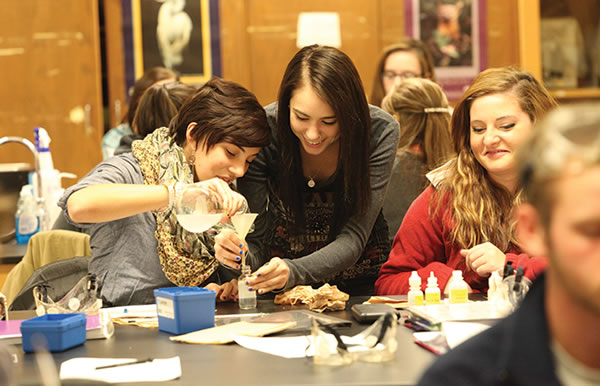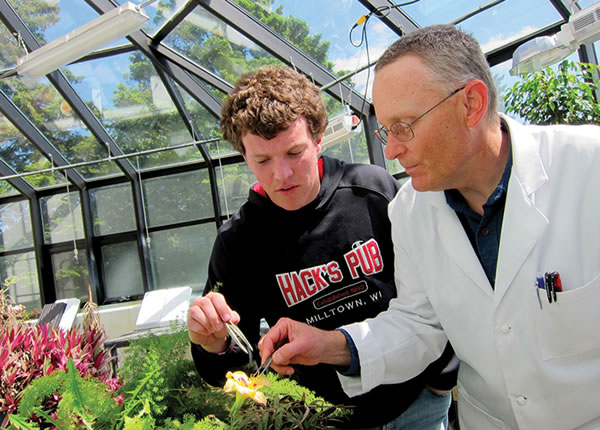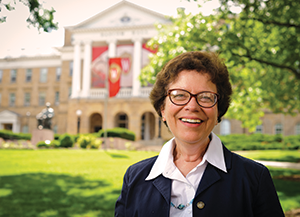You might not know it, but both Vitamin D and the first embryonic stem cell were discovered at the University of Wisconsin (UW). The state has a rich history of providing avenues for commercializing research and has a unique capacity to support business and economic development.
“I like to say we are the ideas factory for the state of Wisconsin,” says Rebecca Blank, chancellor of UW-Madison, “and I believe we are a great resource for innovation and entrepreneurship.”
With nearly 90 years of partnering with the Wisconsin Alumni Research Foundation to bring technology to the marketplace, UW helps stimulate economic growth and create jobs. UW research has spawned at least 283 startups that support more than 21,000 jobs and contribute an estimated $12.4 billion to Wisconsin’s economy.
Researchers from the UW Department of Medicine and the Agricultural College have teamed up on a five-year, $16-million grant from the National Institutes of Health to find new resources of antibiotics to combat the rising number of deadly antibiotic-resistant infections. And a research team at the UW Carbone Cancer Center has developed a model that can more accurately pinpoint the risk of aggressive prostate cancer.
“This university brings more than $1 billion in federal research funding into Wisconsin annually.
We’re the third-highest in the nation in terms of federal dollars received on campus,” says Blank. “We award about 10,000 degrees each year: 6,500 undergraduate degrees, 2,100 master’s degrees, 700 clinical doctorates and 750 Ph.D.s, which makes us the fifth-largest producer of Ph.D.s in the country.”

UW Extension knows how help students develop ideas in the marketplace. Ranging from mobile payments for fast-food vendors, engineering ideas for cat food feeders, and recreational devices like sail boards all the way across to liver diagnosis software, UW is all about fostering an innovative environment for education and business.
“Whether it be teachers in schools K-12 or farmers who are now using drones to monitor their crops,” says Cathy Sandeen, chancellor of UW Colleges and Extension, “it’s crucial to economic development to have a mechanism [for] getting information to the people who can apply it in order to make their businesses grow and thrive.”
Economic Ecosystem
Within the last year, the Division for Business and Entrepreneurship at UW-Extension has assisted more than 4,000 companies in 69 counties in Wisconsin. Providing one-on-one consultations, the university helped them position themselves to obtain additional capital funding to expand their businesses.
“In general, what we’re trying to do is build a business and economic development ecosystem where all the pieces of that ecosystem work together very smoothly and continue to grow and thrive,” says Sandeen. “We want to remain nimble, flexible, connected and impactful. That’s our vision for the future.”
Organic Research Corporation is a healthcare software company which started through UW’s Ideadvance Seed Fund. The program is a collaborative effort between UW-Extension, UW system and the Wisconsin Economic Development Corporation, with the goal of advancing research from faculty, staff and students and applying their expertise to the economic development of the state.

Scott Vanderbeck, president of Organic Research Corp., came up with an idea for software that assists doctors in looking for disease markers when examining medical images. The technology made its way to the University of Wisconsin-Milwaukee (UWM).
“When I heard the technology was up for grabs, I approached UWM to see if they would be open to a startup and they were very receptive to that,” says Vanderbeck. “They got licenses for it, which means that essentially I developed the product but they owned the intellectual property.”
Vanderbeck says that UW’s research foundation was an excellent resource, and that led him to the Ideadvance Seed Fund.
Ideadvance is a two-stage process, similar to an accelerator program. The program only accepts startups that were formed by active students or professors at the university, or small businesses that were licensing technology through one of its campuses.
“We had this technology and these grand ideas, but didn’t have any direction on what needed to be done with it,” says Vanderbeck.
The program helped bring Organic Research Corp. and many other startups to fruition. But UW assists with existing businesses as well, working to ensure their students have the skills for the future.
“Working with existing businesses is something that’s often left as a lower priority,” says Mark Lange, executive director of the Division for Business and Entrepreneurship. “It’s about a portfolio approach that is what all economic developers strive for, making sure you have a balanced portfolio with new ideas, existing businesses and companies that are attracting business.”
Workforce Education
“Workforce development folks get all excited about finding talent, but all of that is focused on jobs that already exist,” says Lange. “By working with business owners and trying to provide education and information to help make better decisions, we’ll create an even better workforce. Business owners are a part of the workforce as well.”
UW-Madison recently collaborated with fast-growing healthcare software firm Epic to launch a program last summer, and 70 students were enrolled this past fall. The collaboration is aimed at working professionals with a bachelor’s degree in quantitative fields such as mathematics and physics who want to learn software development and pursue software developer jobs at Epic through specialized training.

Collaboration efforts with businesses are not only taking place at Wisconsin’s universities, but in technical colleges as well. The Wisconsin Technical College System comprises 16 colleges, each of which has an employer advisory committee. That structure puts area employers in the same room as college instructors to develop and modify what is taught to students.
“We have the ability not only to respond to the potential for new business opportunities, but to flexibly work with existing employers to help them compete and grow,” says Morna Foy, president of the Wisconsin Technical College System. “That puts us squarely in the middle of any successful regional or statewide economic development discussion.”
The state has many success stories to tout in terms of business growth and research, but there’s something else there that isn’t always quantifiable.
“We have a new success story every time a graduate crosses the stage and walks directly into a great career,” says Foy. “Those graduates are bringing the skills to help that business compete and grow.”

